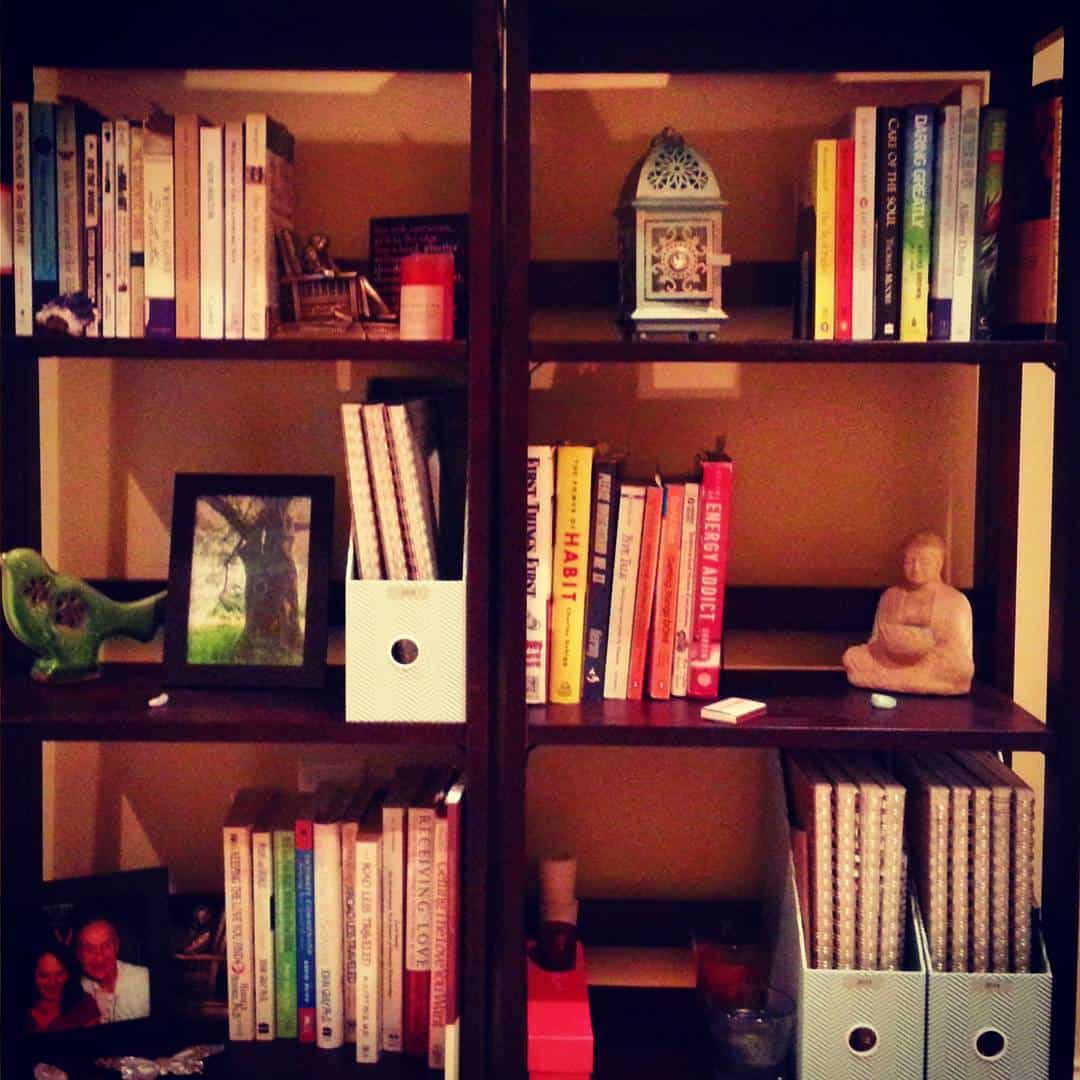Last week I shared a little history of my personal experiences with journal writing, including the time my mother found and destroyed all the journals I’d kept from childhood through college.
Even if you haven’t been in the exact same situation, I’m sure you can imagine why I was afraid to put my thoughts on paper again.
It wasn’t just about the physical destruction of my creative work. I was angry.
I felt as if my soul had been irreparably torn. I’d had any sense of privacy shattered. Betrayal by a person that should have kept me safe.
I believed to my core that anyone whom I loved (or should trust) could come along and read those thoughts and damn me for a moment of anger or indecision or spiritual challenge.
I looked for happiness in all kinds of places: my marriage, having babies and being on the PTA, work, buying unnecessary material things, and all kinds of crazy-busyness. But these soul deep beliefs that no one was really trustworthy and that I wasn’t worthy of love or respect sabotaged any long-term satisfaction with my life.
Despite my sharing with you about how much I love my life and how I came to terms with my own birthright to love and worthiness, it still might surprise you that today, I do keep a paper journal.
But, baby, I had to do a hell of a lot of work around taking a pen in my hand and allowing my thoughts to be born onto the paper.
Now, over the years, of course I wrote on paper, but it was never anything long term. Well, I used the Franklin Covey Planner system for ages, but I compartmentalized and only wrote work notes and flight plans there. I would create a temporary journal for a project or a class, but once that was over, I abandoned them and returned to the safety of the electronic page.
Each time I put the paper away, it was like I laid a log upon the base of a bonfire. I needed more fuel for the bonfire, though, in order for it to be big enough.
Keeping a journal is a way to build upon your inner strength and courage, but for me, going back to writing on paper took not just strength and courage, but more.
It took trust. It took grace. It took compassion. It also took love.
The journey back to the use of indelible ink on physical paper, instead of a reliance on the ephemeral nature of the internet, was about far more than the mere act of writing. It was about resolving the betrayal I had experienced years ago.
It was about healing my heart and soul.
Darling, I had to be willing to trust that I was safe and that others were trustworthy.
When someone who is in a role tasked with loving us or keeping us safe betrays us, it often makes us believe that the only person we can trust is ourselves.
Though it can feel paralyzing to trust or love, painting everyone with the same brush as someone who betrayed you isn’t fair to them, but most importantly, you don’t deserve to live with that kind of fear.
That requires a willingness to be vulnerable.
Being vulnerable is so incredibly frightening that we humans have all kinds of ways to keep from feeling that way. We numb ourselves with food or alcohol or shopping, or by keeping ourselves too busy to feel or think.
We build walls around our hearts so that no one can get too close. We wear masks to hide our true selves, and we play a variety of roles so that no one gets to know the real person behind those masks.
But yet the reality is that if you want to live your life and be ‘all in‘ instead of merely on the outskirts trying to survive, you are going to have to let yourself be vulnerable. You have to be willing to take a risk that yes, you could experience heartache or betrayal.
It can feel like a vicious cycle: You can’t be vulnerable around people who haven’t earned the right to witness you in all your glory. You can’t be vulnerable with someone you don’t trust. Yet, you may not really trust anyone.
So, trust and vulnerability are going to require you to trust your intuition. You’re going to have to learn to listen to your innermost heart, and respect your deepest longings.
You’re going to have to make a leap of faith.
Part of my journey to loving my life and being happy was recognizing that I was – and am – more engaged with my own life when I’m keeping a journal.
Moreover, the act of bleeding my thoughts onto physical paper with ink was a longing that continually surfaced and resurfaced in my life.
The connection from heart to hand to pen to paper was – and is – an intrinsic part of who I am at my very core.
So here we are with this bonfire waiting to blaze up and burn away all those old pieces of betrayal.
And I do mean bonfire, which word comes to us from the ancient times, when we burned bones for protection.
This is no mere campfire, meant for roasting hotdogs or melting s’mores, but a fiery blaze, designed to sear away betrayal, and cauterize the wounds left behind.
This particular bonfire of mine has more than one kind of log. There are the logs made from the old dreams of my teenaged self. There are logs formed from shattered trust and parental betrayal. There are logs formed from censorship of my innermost thoughts. Right next to them are the judgement logs decorated with my fear that my opinions and beliefs were wrong, dirty and unacceptable.
Piled onto the bonfire pyre is the belief that I am not worthy.
There are “facts“heaped on top of those logs, too. The fact that no one would love me unless I kept my thoughts to myself. That no one would accepted me and want me unless I kept my mouth shut.
There are little sticks and twigs, too. The idea that I didn’t deserve to have a thoughtful conversation with myself.
And how could I forget the huge, heavy logs made up of the sure belief that I wasn’t deserving? That I didn’t deserve to love anyone. That I wasn’t a good enough girl to BE loved by another. And that I could never trust anyone to keep me safe.
I had to stuff in as kindling all the tiny journals I kept for projects, the work notes in my planner, and the notebooks that held a combination of meeting minutes and pieces of short stories. Those had to be added along with those big logs. I also had to include all those pieces of virtual paper: blogs, poems, articles and columns.
Building a bonfire means you also need to construct a fire ring made of rocks.
These are rocks of intuition, a sense of self, confidence, and the larger rocks – boulders really – of faith and hope and courage. There are rocks that others contribute to the surround, as well. Those are the rocks representing their own hearts and their willingness to be vulnerable too.
Once you’ve stacked the logs and stuffed in the kindling, though, fires need a spark, a way for the blaze to begin.
My friend and colleague Kayce had come for a planning retreat. She whipped out her paper journal and showed me a collage page filled with her vision for the year. My first thought was “how frivolous” and “I don’t have time for such nonsense” (the voice of my mother in my head).
Then came that hot spark of envy.
My soul longed to put ink and glue and pictures and words on paper.
The fire had begun.
When we overcome betrayal and build a bonfire, we need a witness. We need help. She served as my witness, though she didn’t know the full history of paper journals in my life. She served as my helper, accompanying me to the art supply store as I picked out a new kind of spiral.
The next morning, instead of turning on the computer, my thoughts flowed through my hand as I put ink to paper.
Yet, the story doesn’t end with the start of the fire.
We have to stoke the fire long enough for it to burn up all those logs. We have to burn them all to ash.
After my first witness and helper with the fire left, I had to continue to tend that fire.
I had to continue to write on paper.
Unbeknownst to him, JB was my next witness to my tending the blaze. I loved him and trusted him, but I needed to test him, too. I needed to see proof that the person I loved wouldn’t betray the trust I had given him. I did this by leaving my new journal OUT and accessible and seeing that he didn’t touch it.
I had to stand naked before the fire and let it burn long enough and hot enough to burn up my belief that writing on paper wasn’t safe.
Though I believe that keeping a journal can be beneficial to everyone, my telling you this story isn’t really just about little spiral notebooks and pens.
The fire is about transforming yourself. And, dear, God, the fire is beautiful.
You don’t chicken out and douse the flames with doubt. You don’t abandon the fire because you don’t feel that you are worthy to witness the smoke or feel the hot flames against the skin of your soul.
You tend the fire and let the old beliefs about yourself – the ones that are sabotaging your every attempt for real happiness and deep joy – go up in smoke.
We tend the fire with compassion, too.
As the fire burns away those old thoughts and ways of existing, know that there are going to be hot spots and some pain, too. It’s hard to leave our old stories behind, especially the beliefs that we’ve clung to as a part of our identity.
There may be grieving involved as the fire begins to fade; grief for who we used to be and the people we have to leave behind in order to move forward. And we can’t forget about the uncertainty of what will happen once the fire is out.
When the fire burns out, we may have scars. But darling, we birth a new version of ourselves from the ashes and all those rocks of love and trust.
We are changed. Forever changed.
Three years after the fire began, I am still writing on paper. No longer are my paper journals hidden away in a closet; they live alongside my beloved books in my office. They are accessible for me  to reference.
to reference.
They are out in the open because I am safe. I learned that I am worthy of birthing my thoughts into the world without judgement or censorship.
I learned that I am loveable. I learned that I can give my love and trust to another human being who has vowed to love me and keep me safe, and that word is truth.
But I had to build the bonfire to get here to this place of trust and love and vulnerability and beauty.
What bonfires are you currently building in your life? What logs are you needing to place upon your fire? What kind of spark do you need to light it? What kind of support, help and witnessing do you need to withstand the heat?
(PS – Next week, I’ll share some tips on how to deal with the “new you” once you find yourself in the ashes)









